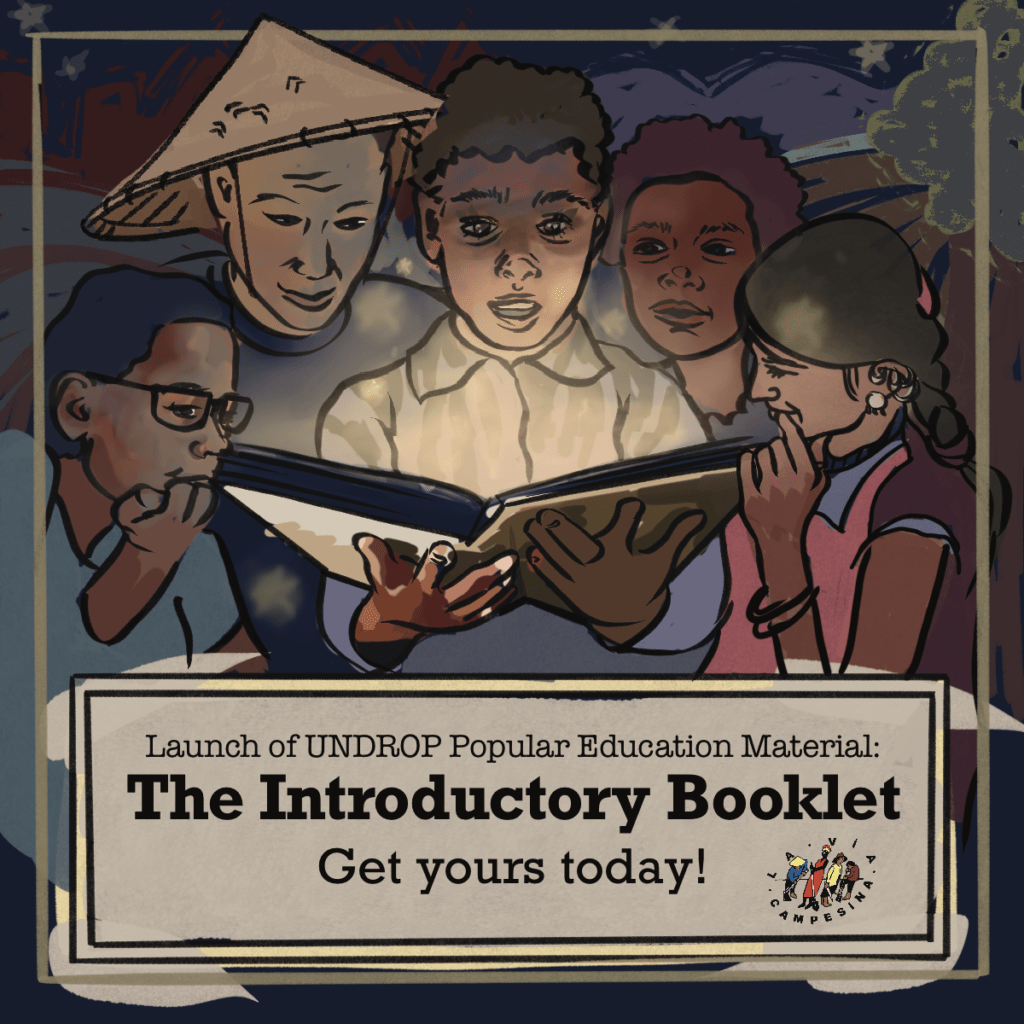Training Modules: UN Declaration on Rights of Peasants and Other People Working in Rural Areas (UNDROP)

16 December 2021, Bagnolet:
On the eve of the third anniversary of the formal adoption of the UN Declaration on Rights of Peasants and Other People Working in Rural Areas (UNDROP), La Via Campesina and FIAN International are launching the first booklet in a five-part toolkit of popular education materials.
Strengthening the Implementation, Assertion and Advancement of Peasant Rights
This 17 December, we celebrate the third anniversary of the international recognition of the human rights of peasants and other people in rural areas. In 2018, on this day, the UN General Assembly had adopted the UN Declaration on the Rights of Peasants and Other People Working in Rural Areas (UNDROP).
The backdrop to this anniversary is undoubtedly bleak. Big businesses continue to violate, with impunity, the rights of peasants and other rural people. Any form of resistance or advocacy to protect these rights is met with blatant criminalizationcriminalization of the social movements leading it. This past year, agribusiness corporations also persisted with their false solutions and Big Tech Reforms in agriculture, despite the worsening COVID-19 pandemic and climate crises. Working hand in glove with the UN Secretary-General, the World Economic Forum, and mega-philanthropies, Transnational Corporations continued to champion an agribusiness free-market narrative at several global policy spaces.
The latest in this series is the UN Food System Summit (UNFSS), held in September 2021 and marred by opaqueness and exclusionary processes. UNFSS outcomes are attempting to shape international narratives and policies on responding to the multiple crises facing humanity and Mother Earth.
Recently, COP26 saw the announcement of many public-private partnerships pledging to fast-track agriculture innovation, financed by the same agribusiness corporations that promoted the Green Revolution, and now masquerading many of their practices under the garb of ‘climate-smart agriculture. And these are not disparate events but an inter-connected attempt, to preserve the dominance of translational agribusiness firms. In many ways, what big corporates have been brewing in Davos over the years as the “template” of a digitalized, high tech future food system became a reality at the UNFSS.
All these recent events and actions indicate that we will continue to witness even more concentration of resources, productive chains and infrastructure among a few corporations. Democratic governance spaces will shrink further, and violate the rights of peasants and workers will worsen.
But what gives hope is also the emergence of organized resistance from affected communities. There is a growing recognition among people that these violations are being carried out with impunity and often in connivance with the local authorities and officials. We cannot discount the relevance and significance of the UN Declaration (UNDROP) in this context. It is a fantastic tool to shield us from profit-driven corporate agenda and roll back the tide of neoliberalism. These training modules offer a practical tool to initiate transformation and take our power back from transnational agribusinesses.
The UNDROP Introductory Booklet is the first in a five-part toolkit of popular education materials.
It is crucial to reconnect the UNDROP to the small-scale food producers worldwide – the same people who inspired its content, who worked on its development and whose Rights to dignified lives and livelihoods continues to be violated. This training toolkit will help us to effectively use the UNDROP in our struggles to assert and advance our collective and individual rights. The purpose of this toolkit is to create broader awareness, promote deeper understanding and enhance capacities (through training) of rural people’s movements. We should use this booklet as a foundational tool to ensure that the UNDROP will be respected, implemented and promoted at all levels, from local to international, from community customs to policymaking mechanisms.
This popular education toolkit is context-based and will empower peasants to improve their livelihoods in rural areas. It will reinforce food sovereignty and agroecology, strengthen the fight against climate change. It recognizes peasants’ rights to conserve, use, exchange and sell their seeds. It defends people’s right to protect blatant attempts to grab land, rivers and oceans. In short, using this toolkit will bring UNDROP to life, turning it into an effective tool for our struggles.
It is crucial that working-class people, rights holders, peasants, and people living or working in rural areas incorporate the UNDROP in their daily struggles and understand how their rights are violated.
To achieve this, the Basic Booklet and the forthcoming four Thematic Booklets have focused on specific articles adopted in UNDROP and how affected people can apply it in legal and advocacy spaces. All peasants must understand their rights for the implementation to be effective, so these booklets are part of a crucial popular education campaign.
For La Via Campesina, the adoption of this Declaration by the UN in December 2018 was only a battle half won. It is now crucial to see this Declaration fully implemented in letter and spirit in every country, everywhere.
UNDROP can help us overcome structural discrimination and violence and promote our rural ways of life to respond to the current political, economic, social and ecological crises. Let’s mobilize ourselves with this toolkit to implement our UNDROP!
Globalise the Struggle, Globalise Hope!
For media queries, write to press@viacampesina.org

